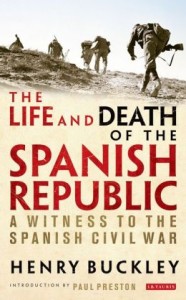Book Review:Henry Buckley: The inside story
This article appeared in the 36th issue of the newsletter of the International Brigade Memorial Trust and is reprinted here with the IBMT’s permission.
The Life and Death of the Spanish Republic: A Witness to the Spanish Civil War. By Henry Buckley, with an introduction by Paul Preston (London: Tauris, 2013).
The reissue of Henry Buckley’s long-lost memoir, “The Life and Death of the Spanish Republic”, is an event which anyone interested in the Spanish Civil War should celebrate. Buckley’s classic eye-witness account of the eight years of the second Spanish Republic from 14 April 1931 to 31 March 1939 is, I think, one of the best accounts of the period penned by a Briton.
Knowledgeable, insightful and beautifully written, Buckley’s memoir possesses a rare sense of immediacy that immerses the reader deep within Spain’s turbulent 1930s. Spain is “a poor country with many rich people”, struggling to cope with a difficult transition, where “new ideas, as well as motor-cars, raced along these fine broad roads which now intersected Spain”. A devout Catholic, Buckley was nevertheless objective enough to recognise the Church’s failings and its complicity in creating and supporting a deeply unequal society. In fact the text is astonishingly fair-minded and objective: while he became deeply sympathetic to the Republican cause (even toying with the idea of joining the International Brigades), he was not blind to its failings, arguing that the Republic needed not just to aspire to be good, but to actually raise the pitiful living standards of the poverty- stricken peasants “[who] still form[ed] the majority of the nation’s population”.
Unlike foreign correspondents who arrived at the outbreak of the civil war, Henry Buckley had been in Spain since 1929. He spoke the language fluently and knew the country well. He was acquainted with many of the key figures in the Republic, including La Pasionaria, Francisco Largo Caballero, Manuel Azaña and Juan Negrín. And his observations of many key figures are not written in the polite banalities of politicians and diplomats. For example, while Buckley has good things to say about many of the Republic’s political and military leaders, especially Negrín and La Pasionaria, he is not always as enthusiastic about the socialist leaders Largo Caballero and Julián Besteiro.
There are occasional factual errors in Buckley’s account, though surprisingly few when one remembers how deeply immersed in the situation the author must have been. And any errors are more than compensated for by the astute observations and intelligent, grounded analysis. The account of Largo Caballero’s own contribution to his fall from office in 1937 is one good example, as is Buckley’s sorrowful analysis of the doomed attempts by the Western democracies to restrict the war to Spain’s borders. Buckley fully understands the inevitable conse- quence of the French and British governments’ determination not to come to the Republic’s aid.
His eloquent account of the final dark days of the Spanish Republic and the dashing of the hopes of those fighting in support of the Republic are heart-rending. Yet, despite all, Buckley’s conclusion is as clear as it is uplifting: “Their courage and efforts were not in vain. No sacrifice like that ever is” – a sentiment that, I suspect, many will feel is as true now as it was 75 years ago.
The paperback version of Richard Baxell’s “Unlikely Warriors: The British in the Spanish Civil War” is published on 1 April by Aurum Press for £12.99.













